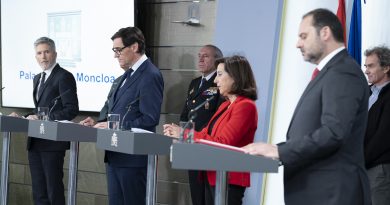Former Catalonian President Detained in Germany
By Vincent Verdile
Staff Writer
The former Catalonian President, Carles Puigdemont, was detained in Germany’s northern most state of Schlewsig-Holstein while traveling from Finland to Belgium to present himself to authorities. This detainment allegedly stemmed from Spanish secret service agents tailing the former president while he was in Finland and alerting German authorities of his arrival, reported The New York Times. Just two days prior the Spanish government had reactivated European arrest warrants for Mr. Puigdemont and five others accused of rebellion and sedition for their role in Catalonian declaration of independence from Spain in October 2017.
Following news of the detainment, protestors took to the streets across Barcelona. Although relatively peaceful, CNN reported that less than ten were arrested and a few dozen were treated for injuries.
Early in March, Mr. Puigdemont, under self-imposed exile within Belgium since October, had announced his withdrawal for a bid as a second term Catalonian President. Reported by Reuters, Puigdemont said his decision was “founded in one reason only – under current conditions it is the way to get a new government under way.” Furthermore, he expressed support for a pro-succession campaigner, Jordi Sanchez, who is currently being held in Madrid under charges of sedition. Adding to the difficulty of Sanchez successfully becoming the next president, Spain’s President Mariano Rajoy declared a “snap” election in December, according to The New York Times. This resulted in the separatist party losing a substantial amount of seats in the Catalonian parliament, retaining a narrow majority.
Prior to the former president’s detainment, lawyers had filed multiple complaints against the Spanish government for violations of self-determination with the United Nation’s Human Rights Council. This international attention hasn’t attracted any significant support from European leaders, but European Union President Donald Tusk believes the situation “cannot be in the interest of Madrid” while calling for peaceful dialogue following the protests, according to The New York Times.
On October 1 2017, Catalonia held a referendum on whether or not to secede from Spain. Due to a crackdown by Spanish police, who used violent force to close down polling stations and confiscate ballot results, there was only a forty-two percent voter turnout, reported the Independent. Those who did vote overwhelmingly supported succession with ninety percent. This prompted the Catalonian to vote on independence later that month, just an hour before the Spanish parliament voted to impose Article 155 of Spain’s Constitution. This article, according to the Independent, allowed the Spanish government to gain direct rule over the Catalonian region, and remove the leaders from power due to declaration of independence. The declaration won with a vote of 70 out of 135, with only ten opposed.
This activation of Article 155 resulted in President Rajoy continuing to control the Catalonians directly from Madrid. As Catalonia’s future remains unknown, Puigdemont will now face a series of legal battles. Due to varying criminal statues and codes throughout the various European countries involved, the former president will not be sent back to Spain right away. Several Catalonian leaders associated with the independence movement, including Puigdemont, had designated Belgium, Scotland, and Switzerland as countries for refuge. This will now prompt all three countries to review his status and make a decision on the international warrant. In addition, because the former president was detained in Germany, a judge will also have to come to a conclusion on whether or not the Spanish warrant is recognized by German law.


